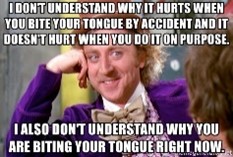Are you looking for a way to tell someone to be quiet before they say something they shouldn’t? You could use “bite your tongue” to ask them to stay silent. This post unpacks the meaning and origin of this expression.
Meaning
The expression “bite your tongue” means that you should keep quiet and refrain from saying anything. Someone could tell you to bite your tongue, or you could choose to do it on your own accord. If someone else tells you to bite your tongue, they are telling you to shut up before you say something you regret or reveal confidential information they don’t want you to tell other people.
You could say to someone that you had to bite your tongue during the meeting. In this case, it would mean that you had to hold yourself back from saying something that you want people to hear, but you don’t think they are willing to listen.
You can also use the expression as a way to tell people to stop swearing around children and women. It’s a way of telling people to be careful about what they say, or they might regret it later. To bite your tongue is to hold back, cease, and desist with your speech.
Example Usage
“Bite your tongue. There’s no reason to speak in this meeting unless someone addresses you directly. Do you understand me?”
“There’s something I wanted to say, but I think I’ll bite my tongue. I don’t think you guys would appreciate what I have to say about all this.”
“If you think you’re going to blurt something out, just bite your tongue. The last thing we need is for you to make a fool of yourself in front of all of these people.”
“Bite your tongue there. That’s no way to speak to a manager. Don’t you know you can get in serious trouble talking to me like that?”
“Bite your tongue, Jefferson. I don’t need to hear your poppycock ideas at this time of the day. If I want to hear from you, I’ll ask you. Now go away.”
“There’s no reason for you to bite your tongue around here. We believe in free speech, and you’re welcome to express any opinion you have.”
“Why did you bite your tongue back there? I thought you would give that guy a lecture, but you didn’t do anything.”


Origin
The expression “bite your tongue” originates from as far back as the late 1500s. The earliest recorded use of the phrase is in William Shakespeare’s play “Henry VI Part 2,” written in 1591. The saying appears as follows.
“Ready to starve and dares not touch his own.
So York must sit, and fret, and bite his tongue,
While his own lands are bargain’d for and sold.”
The phrase appears in its modern format and retains the same meaning some 400+ years later.
Phrases Similar to Bite your Tongue
- Hold your tongue.
- Bite your cheek.
Phrases Opposite to Bite your Tongue
- Speak your mind.
- Speak freely.
What is the Correct Saying?
- Bite your tongue.
Ways People May Say Bite your Tongue Incorrectly
The phrase doesn’t mean that you’re physically biting your tongue. When you bite your tongue, it causes you to focus on the pain rather than your thoughts. So, it’s a way of telling someone to be quiet. It’s also a way of restraining yourself from saying something others may find offensive.
Acceptable Ways to Phrase Bite your Tongue
You can use the saying “bite your tongue” to tell someone to be quiet or tell people you’re restraining yourself from saying something that might upset them. The expression suits social and professional use.
Use it at the client meeting to tell your associate to stay quiet unless spoken to. Use it at home to tell your kids to watch what they say. Use it with friends when you want to express that you’re holding back your opinion.